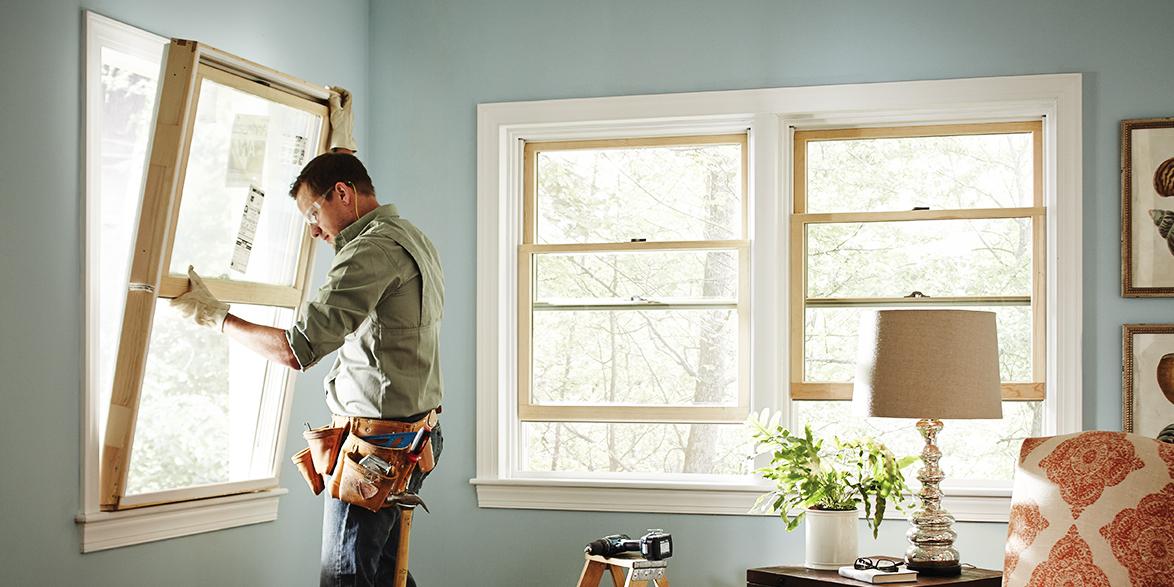Why Replace Your Home Windows?
1. Improve Energy Efficiency
Old or drafty windows can significantly increase your heating and cooling bills. Modern home replacement windows are designed to reduce energy loss and maintain indoor comfort.
2. Increase Home Value
According to Remodeling Magazine, window replacement projects can return over 70% of their cost in home value. Buyers appreciate the aesthetic and efficiency of new windows.
3. Enhance Curb Appeal
New windows can transform the look of your home, both inside and out. Whether you’re selling or staying, this upgrade boosts visual appeal.
4. Noise Reduction and Security
Double- or triple-pane replacement windows provide better sound insulation and often include advanced locking systems for enhanced security.
Types of Home Replacement Windows
1. Double-Hung Windows
Popular in many homes, double-hung windows allow both the top and bottom sashes to open. They’re easy to clean and offer excellent ventilation.
2. Casement Windows
Hinged on one side, these windows swing open like a door. They provide a tight seal when closed, making them energy efficient.
3. Sliding Windows
These horizontal windows slide open and are great for wide spaces and modern homes.
4. Bay and Bow Windows
These multi-panel windows protrude from the home, adding space and architectural interest. They’re great for living rooms and front-facing walls.
5. Picture Windows
Fixed and non-opening, picture windows offer wide views and are ideal for areas where ventilation isn’t necessary.
Window Frame Materials
1. Vinyl
Affordable, durable, and low-maintenance. Vinyl is also energy efficient and resists moisture.
2. Wood
Offers a classic appearance and excellent insulation but requires more maintenance. Great for traditional or historic homes.
3. Aluminum
Strong and lightweight, aluminum windows are best for modern designs but are less energy efficient.
4. Fiberglass
More expensive but extremely durable and energy efficient. It can mimic the look of wood with less upkeep.
Cost of Home Replacement Windows
The cost can vary based on size, material, brand, and labor. Here’s a general breakdown:
- Vinyl Windows: $300 – $850 per window
- Wood Windows: $800 – $1,200 per window
- Fiberglass Windows: $600 – $1,400 per window
- Labor Costs: $100 – $300 per window (installation)
Pro Tip: Replacing multiple windows at once often results in discounts from contractors.
How to Choose the Right Replacement Windows
1. Assess Your Needs
Do you need better insulation? More natural light? Consider your climate, budget, and personal style.
2. Check for Energy Star Certification
Energy Star-rated windows meet federal guidelines for energy efficiency, saving you money in the long run.
3. Understand Window Ratings
Look for U-factor (insulation), SHGC (solar heat gain), and VT (visible transmittance) ratings.
4. Hire a Reputable Installer
Look for companies with certifications, positive reviews, and warranties. Always ask for a written estimate.
Installation Process
Step 1: Home Assessment
A technician measures your windows and discusses your needs.
Step 2: Window Selection
Choose from a catalog of sizes, styles, and materials.
Step 3: Old Window Removal
Professionals carefully remove existing windows to avoid damage to your home.
Step 4: New Window Installation
New units are installed, sealed, and tested for performance.
Step 5: Cleanup and Inspection
The crew ensures the site is clean and conducts a final inspection.
Benefits of Energy-Efficient Windows
- Lower Utility Bills: Better insulation reduces heating and cooling needs
- Comfort: Consistent indoor temperatures year-round
- Environmental Impact: Reduced energy use equals a smaller carbon footprint
- Tax Credits: Some energy-efficient upgrades may qualify for government incentives
Learn more about energy savings from the U.S. Department of Energy
Common Mistakes to Avoid
- Choosing Based on Price Alone: Cheaper windows may lack durability and efficiency
- Ignoring the Warranty: Always check what the warranty covers
- DIY Installation: Unless you’re experienced, professional installation ensures proper sealing and performance
Final Thoughts
Home replacement windows are a worthwhile investment for comfort, savings, and value. By understanding your options, comparing materials, and hiring the right professionals, you can transform your home for years to come.
Whether you’re updating a single room or your entire house, take the time to research and choose wisely. Your future self—and your energy bill—will thank you.

